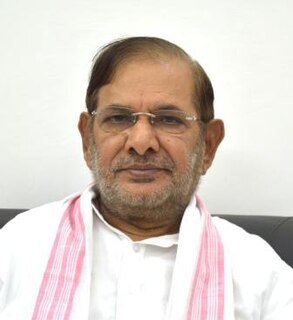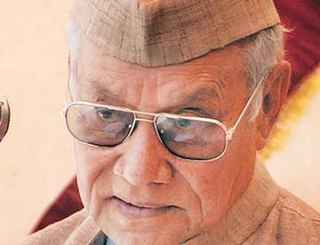
National Democratic Alliance (NDA) is an Indian big tent political alliance led by the right-wing Bharatiya Janata Party (BJP). It was founded in 1998 and currently controls the government of India as well as the government of 17 Indian states.

Janata Dal (United) abbreviated as JD(U) is a centre-left Indian political party with political presence mainly in eastern and north-eastern India. JD(U) is recognised as a state party in the states of Bihar and Arunachal Pradesh and is a part of government in Bihar. JD(U) heads the government in Bihar and has remained the second largest party in Arunachal Pradesh. JD(U) won 16 seats in the 2019 Indian general election, making it the seventh largest party in the Lok Sabha. The party operates on the ideologies of socialism, secularism and integral humanism.

The Rashtriya Janata Dal is an Indian political party, based in the states of Bihar and Jharkhand. The party was founded in 1997 by Lalu Prasad Yadav.

Janata Dal was an Indian political party which was formed through the merger of Janata Party factions, the Lok Dal, Indian National Congress (Jagjivan), and the Jan Morcha united on 11 October 1988 on the birth anniversary of Jayaprakash Narayan under the leadership of V. P. Singh.
Lok Shakti is a political party in India. Lok Shakti was one of several parties that were formed when the Janata Dal crumbled in the mid-1990s. LS was formed in February 1997 after Ramakrishna Hegde was expelled from Janata Dal. Lok Shakti emerged as a major party in Karnataka. It was a founding member of the National Democratic Alliance.

The Lok Janshakti Party is a state political party mainly based in the state of Bihar, India. The party was formed in 2000 when Ram Vilas Paswan split from Janata Dal (United). The party has a considerable following amongst Dalits in Bihar. As of June 2021, Pashupati Kumar Paras is the national president of the party. The party is a member of the National Democratic Alliance. The Party is factioned into two parties Lok Janshakti Party and Rashtriya Lok Janshakti Party.

Nitish Kumar is an Indian politician, who is serving as the 22nd Chief Minister of Bihar, a state in India, since 2015 and has served in that role on five previous occasions. He has also served as a Union minister in the Union Government of India.
Raghunath Jha was an Indian politician who was Union minister of State for Heavy Industries and Public Enterprise and member of the 14th Lok Sabha of India. He represented the Bettiah constituency of Bihar and was a member of the Rashtriya Janata Dal (RJD) political party. Born in Village Amba Ojha Tola, in Sheohar He started his career by becoming the Mukhiya of his home panchayat in the year 1967. Thereafter, in 1967 he became Chairman of Zila Parishad. He started his legislative career in 1972 when he was elected as a MLA on Congress Ticket. He was elected from Sheohar for a record six consecutive terms till 1998. He was twice elected as a Member of Parliament from Gopalganj and Bettiah respectively.

Sharad Yadav is a politician from the Loktantrik Janata Dal party. He has been elected to Lok Sabha seven times and to Rajya Sabha thrice from JD(U). He was the national president of Janata Dal (United) since its formation in 2003 till year 2016. He was disqualified from Rajya Sabha and removed from party leadership positions for engaging in anti-party activities.
Janata Parivar Alliance is an alliance in Indian politics to describe the various political parties that emerged from Janata Dal or others. The Janata Parivar includes, amongst others, Janata Dal (United) and Janata Dal (Secular).

The politics of Bihar, an eastern state of India, is dominated by regional political parties. As of 2021, the main political parties are Rashtriya Janata Dal (RJD), Janata Dal (United) (JDU), Bharatiya Janata Party (BJP) and Indian National Congress (INC). There are also some smaller regional parties, including Rashtriya Lok Samata Party, Hindustani Awam Morcha, Jan Adhikar Party and Rashtriya Jan Jan Party and Lok Janshakti Party, which play a vital role in Bihar politics. As of 2021, Bihar is currently ruled by a coalition of the JDU and the BJP.

Ram Sundar Das was an Indian politician and former Chief Minister of Bihar state. He was a two-time Member of Parliament from Hajipur constituency.
Brahmanand Mandal is a Bihari politician who served as a member of the Lok Sabha from Munger constituency for three terms under three different political parties: in 1991, as a member of the Communist Party of India, in 1996 under the Samta Party, and re-elected in 1999 as part of Janata Dal (United).

Rashtriya Lok Samta Party was a political party in India led by Upendra Kushwaha. It was launched on 3 March 2013 and is based in the state of Bihar. The party was formed in opposition to Nitish Kumar and his Janata Dal (United). It has faced multiple rebellions and desertions since 2015. On 14 March 2021, Upendra Kushwaha has merged RLSP with JDU.

Upendra Singh Kushwaha is an Indian politician and former Minister of State for Human Resources and Development in the Government of India. He is former MP from the Karakat constituency in Rohtas district, Bihar. He is a former member of the Rajya Sabha. He was the leader of his own party the Rashtriya Lok Samata Party, until it merged with Janata Dal (United) in 2021.

The Loktantrik Janata Dal (LJD) is an unrecognized registered political party in India. It is nationally launched by Sharad Yadav and Ali Anwar in May 2018 with the support of Jayakumar Ezhuthupally from Kerala. The party was formed after Yadav parted ways from Janata Dal (United), due to its alliance with Bharatiya Janata Party in Bihar.
Hindustani Awam Morcha is an Indian political party having presence in Bihar.
Mahagathbandhan, also known as Grand Alliance, is a coalition of political parties in the Eastern state of Bihar in India, formed ahead of the upcoming 2020 Vidhan Sabha elections in Bihar. The alliance consists of Rashtriya Janata Dal (RJD), Indian National Congress (INC) and several Left parties including Communist Party of India (CPI), Communist Party of India (Marxist–Leninist) Liberation-CPIML(Liberation) and Communist Party of India (Marxist) (CPIM), with Tejashwi Yadav as the proposed Chief Minister candidate.

The Bihar Legislative Assembly election was held in three phases through October–November to elect members to the Seventeenth Bihar Legislative Assembly. The term of the previous Sixteenth Legislative Assembly of Bihar ended on 29 November 2020.

The Luv-Kush equation is a political term used in the context of the politics of Bihar, to denote the alliance of the agricultural Kurmi and the Kushwaha caste, which together constitutes approximately 15% of the state's population. The alliance of these two caste groups has remained the support base of Nitish Kumar, as against the MY equation of Lalu Prasad Yadav, which constitutes Muslims and the Yadavs. Caste consciousness and the quest for political representation largely drive the politics of Bihar. The political alliance of the Koeri and the Kurmi castes, termed the "Luv-Kush equation" was formed when a massive Kurmi Chetna Rally was organised by members of the Kurmi community in 1994 against the alleged casteist politics of Lalu Yadav, who was blamed by contemporary community leaders for promoting Yadavs in politics and administration.















